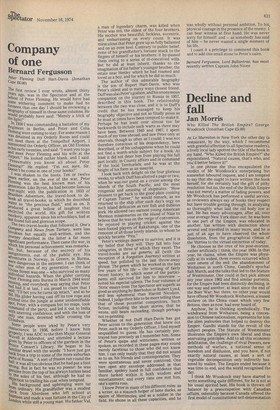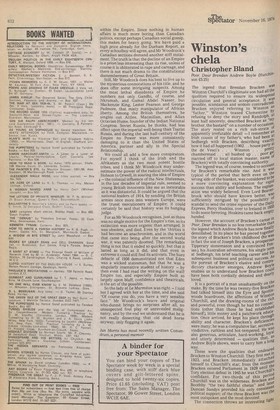Decline and fall
Jan Morris
Who Killed The British Empire? George Woodcock (Jonathan Cape £5.00)
At Le Marmiton in New York the other day (a restaurant, by the way, which I recommend with grateful affection to all Spectator readers), a lively local lady spotted the title of the book in my hand. "Who Killed the British Empire?" she expostulated. "Natural causes, that's who, and you'd better believe it!"
In one phrase she thus encapsulated the verdict of Mr Woodcock's enterprising but somewhat laboured inquest, and I am tempted to say that she ought to have written the book herself, for she certainly had the gift of pithy resolution: but no, the end of the British Empire was not merely a matter of fading powers, and Mr Woodcock has performed a useful service, as reviewers always say of books they respect but have trouble getting through, in analysing so thoroughly what laid the old body low at last. He has many advantages, after all, over your average New York diner-out: he was born in one part of the Empire, was educated in another, has written with distinction about several and travelled in many more, and he is just of an age to have observed the whole dissolution, from the geographical climax of the 'thirties to the virtual extinction of today. He chooses as the crux of his post-mortem, , rather artificially I think, the year 1930. In that year, he claims, when the Empire was physi cally at its widest, three events occurred which were omens of the end: the abandonment of Weihaiwei in north China, Gandhi's epochal Salt March, and the talks that led to the Statute of Westminster. One could in fact pick almost any year since 1902 and find similar portents, for the Empire had been distinctly declining, in one way and another, at least since the end of the Boer War: but there, no other year would have offered Mr Woodcock Weihaiwei, a leased enclave on the China coast which very few Britons, then as now, had ever heard of.
Anyhow, he is thinking symbolically. The withdrawal from Weihaiwei, being a concession to Chinese nationalism, represents for him the alien jealousies that helped to destroy the Empire. Gandhi stands for the revolt of the subject peoples. The Statute of Westminster illustrates the Empire's own liberal and thus enervating principles. Add to all this economic debilitation, the challenge of rival Powers, new methods of warfare, a national sense of boredom and disillusion, and you have, if not exactly natural causes, at least a sort of vegetable decomposition only indirectly hastened by malice. The Empire ended because it was time to end, and the world recognised the day.
I think Mr Woodcock may have started to write something quite different, for he is not at his usual spirited best. His book is thrown off balance by a preoccupation with Canadian taffairs, ostensibly because Canada offered the first model of constitutional self-determination within the Empire. Since nothing in human affairs is much more boring than Canadian politics, except perhaps Canadian social gossip, this makes for heavy going. We have paid a high price already for the Durham Report, as every schoolboy will agree, and Mr Woodcock's Canadian sections demand another stiff instal ment. The truth is that the decline of an Empire is a priori less interesting than its rise, unless of course it is obliterated in rape and carnage, and there is not much drama to the constitutional dismemberment of Great Britain.
Still, Mr Woodcock does his best to live up to the mysterious connotations of his title, and he does offer some intriguing suspects. Among the most lethal dissidents of Empire he numbers not only Gandhi, of course, and Nkrumah, and Garnal Abdel Nasser, but Mackenzie King, Lester Pearson and George Padmore, that misty manipulator of African liberty. Among the British themselves, he singles out Attlee, Macmillan, and Allan Octavian Hume, founder of the Indian National Congress. Soviet Russia, he thinks, had less effect upon the imperial well-being than Tsarist Russia, and during the last half-century of the Empire no Power was more consistently damaging to it than the United States of America, partner and ally in the Special Relationship. We could all add a few more conspirators. For myself I think of the Irish and the Afrikaners as the two most potent hostile tribes, and I think Mr Woodcock may underestimate the power of the radical intellectuals, Hobson to Orwell, in souring the idea of Empire
— the colonial influence of the New Statesman, in the last decades of imperial rule, seemed to
young British innocents like me as inexorable as it was distasteful. It could be argued that the national leaders of 1914, by sending the British armies once more into western Europe, were the truest executioners of Empire: it could certainly be said that history was its hanging judge.
For as Mr Woodcock recognises, just as there was no single motive for the Empire's rise, so its extinction was more organic than arranged. It was obsolete, and died. Even by the 'thirties it had become an anachronism, and in the world that came into being after the second world war, it was patently doomed. The remarkable thing is not that it ended so quickly, but that it lasted as long as it did, and that even in extremis it could still find its activists. The Suez debacle of 1956 demonstrated not that Eden was a wicked statesman, but that he was a
singularly insensitive student of history — by then even I had read the writing on the wall!
Empire too, and especially Empire built so largely upon bluff, confidence and theatricals, is the art of the possible.
So the lady at Le Marmiton was right — I told her I agreed with her at the time, and she said
"Of course you do, you have a very sensible face." Mr Woodcock's brave and original who-dunnit brings no surprises after all, no unsuspected foul play or unrevealed malignancy, and by the end we understand that he is not really dissecting that old dead horse anyway, only flogging it again.
Jan Morris has most recently written Conundrum, a personal memoir



































 Previous page
Previous page